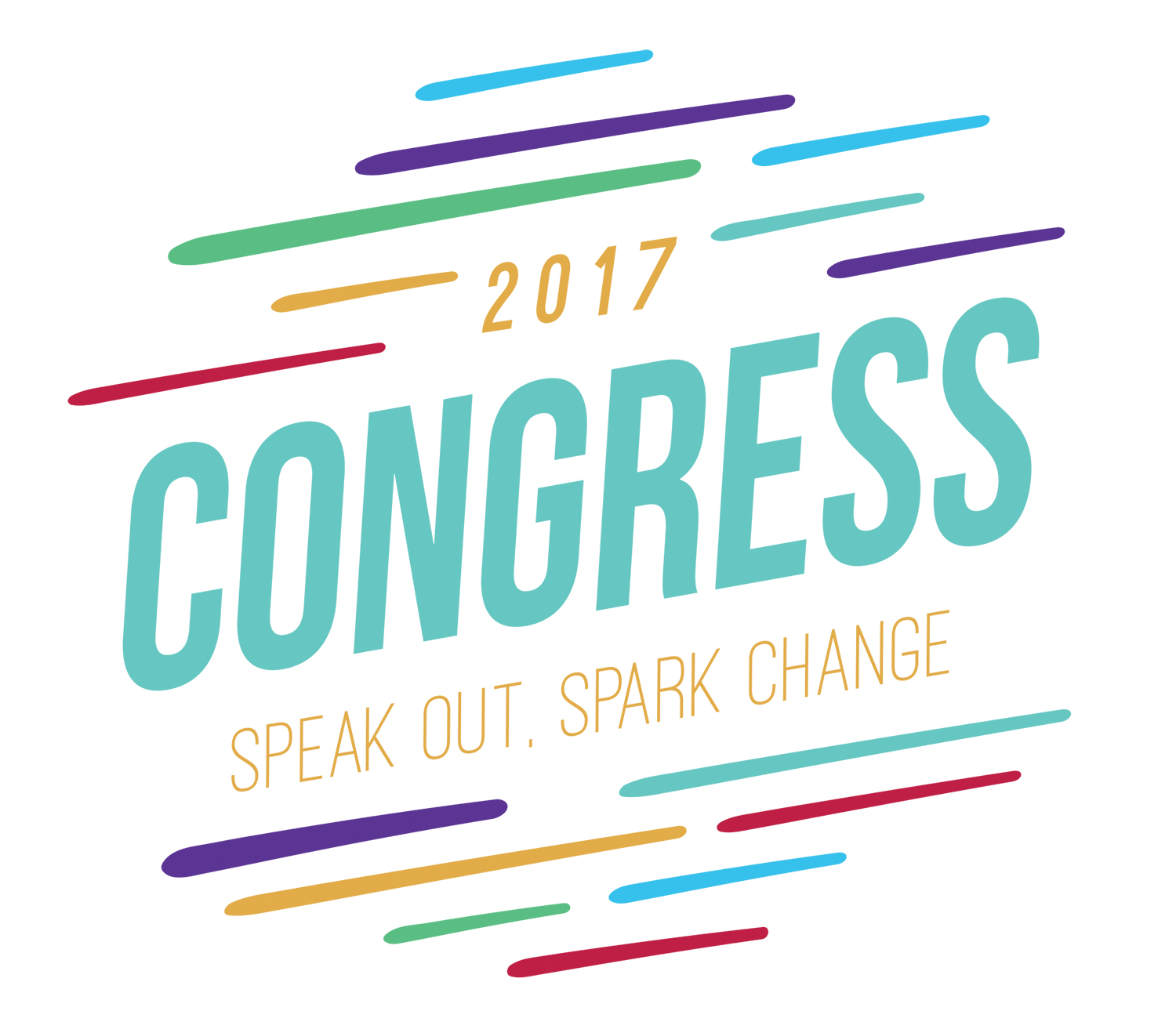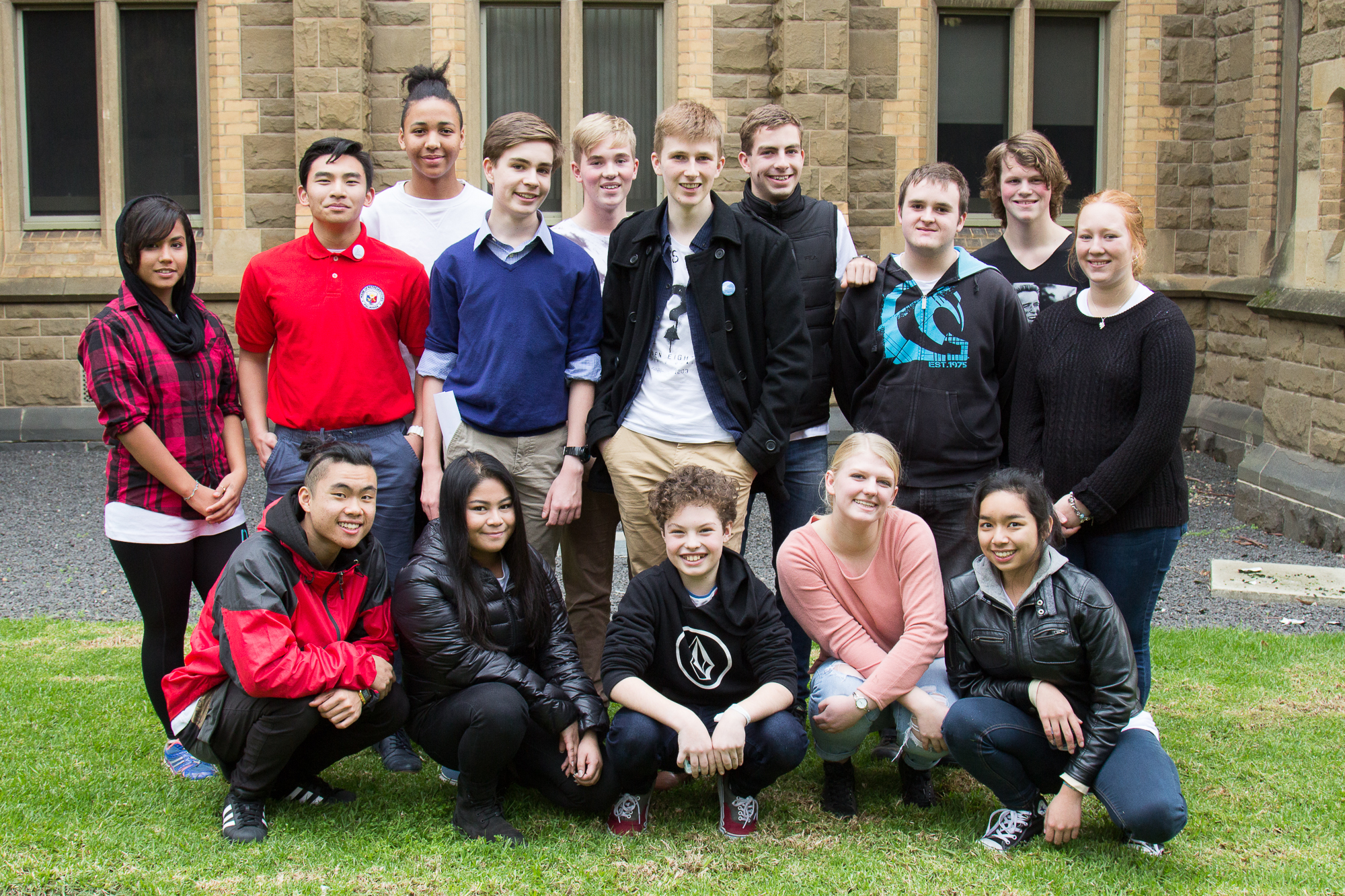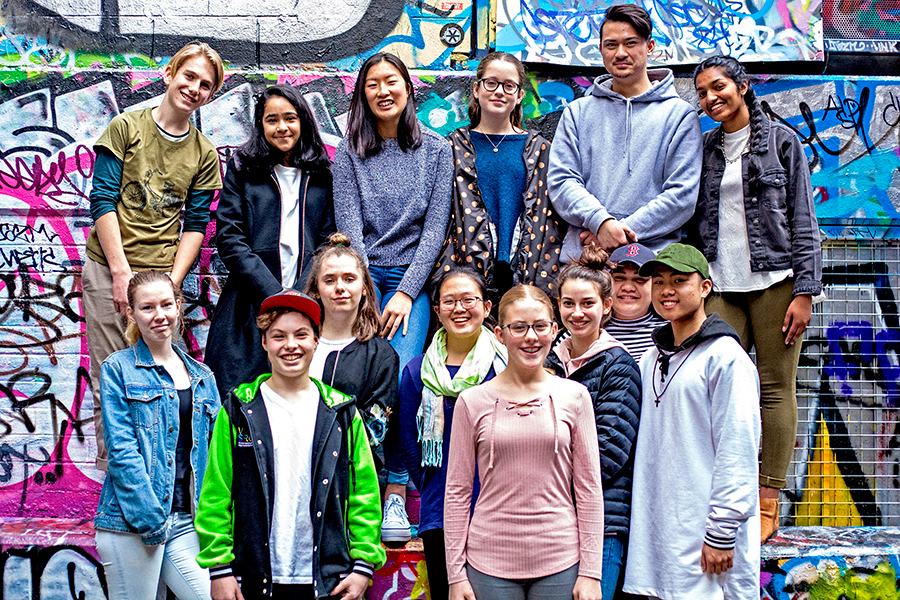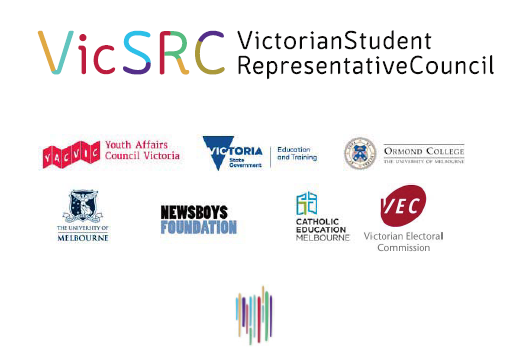Speak out, spark change.
Three days, 180 students, 15 Exec, 37 volunteers, 7 staff, our second ever Open Morning and a choose-your-own-adventure model - it's safe to say that the VicSRC Congress 2017 was the biggest yet!
For three days in July, the collective genius and positive energy of students from all corners of the state simply could not be contained. From within and outside the halls of Ormond College, the roar of student voices rang out.
Congress 2017 was truly owned by the students who attended, where they pitched unique ideas, decided in real-time on the issues they wanted to act on and formed action teams that deliberated over where to go to go next.
Congress 2017 also saw:
• Over 50 educational sector stakeholders support Congress Open Morning and listen to the roar of Student Voice.
• A reach of over 151,000 people on social media.
• A personal visit from James Merlino, Deputy Premier and Minister for Education.
• The VicSRC's Student Representation on School Governance Councils research report enthusiastically launched by Principal Commissioner for Children and Young People, Liana Buchanan;
• The launch of the VicSRC 2017-2020 Strategic Plan - a significant feat for our tireless Student Executive Team that provides a strong direction for the organisation for the next 3 years.
This report provides an overview of Congress 2017 and twelve solutions to issues affecting education that matter most to Victorian students. We urge all students, teachers, principals and education sector stakeholders across Australia to consider how they can adopt and implement these student-led initiatives within their settings.
Student voice was strong and we truly saw students speak out and spark change.

We have the power
to turn ideas into action.
Foreword
With your voice, your ideas and by working together, we can make a positive change to our education.
The first time I attended Congress in 2016, I was inspired by the amount of students from across the state wanting to transform and be in charge of their education. Though no matter how important it is to make education better for students - Congress is also about being inspired and connecting with other students from all across the state!
From Echuca to Warrnambool, Bendigo to Melbourne and everywhere in between, students come to Congress from all across Victoria. Not only did staff, volunteers and our amazing 15 executive members experience a thrilling three days, we were accompanied by over 180 students who presented 12 action team proposals at an amazing Open Morning Lightning Lobby to over 300 people.
It doesn't matter whether you came from a government, private, Catholic, TAFE or flexible education setting - what mattered was your voice, ideas and knowing that if we work together, we can make a positive change to our education!
My first year at Congress I was elected onto the Exec, and I knew from the beginning that I wanted to work alongside some other amazing people to create a Congress that was just as good, if not better than what I was privileged to experience.
Having an un-conference style at this years event meant that students could organically choose the issues that were most important to them at the current time! Thanks to the amazing staff, volunteers, Exec and delegates, our Action Market and Open Morning sessions were a huge success.
It is clear that the students who come to Congress care deeply about their education and are willing to do everything they can to speak out on behalf of all students. If there's a way of making a positive change, the delegates will find it, by working together and achieving great success.
Chelsea Hard, 17, St Josephs College, Echuca | VicSRC Congress 2017 Coordinator
"The best experience OF MY LIFE and i'm definitely coming next year!!"
Delegate, Congress 2017

Setting the scene
About us
The Victorian Student Representative Council (VicSRC) is the peak body representing students in Victoria. Our vision is a student-focused education system that enhances young people's capacity to change the world. We exist to empower all student voices to be valued in every aspect of education.
About Congress
Together, we are powerful.
Run by students, for students and attended by the Minister for Education, the VicSRC Congress brings students together from all across the state to debate, decide and act on the issues that really matter to their education.
Through interactive workshops and solutions-focused debate, student delegates determine the VicSRC policy agenda for the coming year, and appoint the Student Executive team that will implement it.
In 2017, we mixed things up. Delegates shaped Congress in real time, taking control of the conversation by incorporating a choose-your-own-adventure format. Their passions drive their voice and choice as students worked together to set the agenda for education change.
Speak out, spark change. This is #Congress2017.
Empowering Student Voice
Student voice involves more than just listening to students – it involves taking what we say seriously. It means students participating in decisions made about our education.
We have the right to participate in making decisions about matters that affect our lives (as recognised in Article 12 of the United Nations Convention on the Rights of the Child). Giving students a strong voice in our education helps prepare us for our changing world. Students are more engaged in school education when we are involved in shaping our learning.
In order for student voice to impact on the education system in Victoria it must influence policy and program development. Student voice enables policy and program development that is highly relevant and responsive to the needs and aspirations of students.
Students have a right to be heard. In student-focused schools, student participation goes beyond students having a voice only through their representation in an SRC or similar body. When students meaningfully participate in decision-making about their learning, they are more likely to remain involved in education and to achieve better results.
All students have a right to access high-quality teaching, facilities and resources. Needs-based funding is key to helping achieve this. Targeted measures also have a role to play in addressing disadvantage and inequity across school communities.
Respectful relationships between students and teachers matter to students. Respectful relationships between teachers and students strengthen learning. Respectful relationships sit at the core of a thriving and supportive school community. In a culture of respect, students feel safe to learn.
Students learn best when their social and emotional development is supported. Victorians believe that young people’s wellbeing should be as important to schools as teaching students to read and write. Schools are uniquely placed to support students’ development and wellbeing.
"This week has been amazing and really inspired me to go to my own school and act"
Delegate, Congress 2017
The solutions of Congress 2017
Turning ideas in to action
The Resolution Action Pitchs (or RAPs) were the heartbeat of Congress 2017 - our chance to share student-led solutions that go beyond talk into real action.
Through group work and peer-led activities, delegates harnessed the experiences, passion, insight and creativity of students to develop innovative ideas. Each Action Team brought their RAP to present at the solutions-focused Open Morning.
Students voted on each proposal, with the top five forming the VicSRC advocacy platform for 2017-2018.
- 1.Real World Skills
- 2.Student Rights
- 3.LGBTIQ+ Equality
- 4.Student Mental Health and Wellbeing
- 5.Taking Student Voice Seriously
"This event has had a profound impact on my life"
Delegate, Congress 2017
Real World Skills
The issue
Students are leaving school without enough skills or knowledge for real life.
The practical knowledge that will enable us to survive and thrive when we finish school is as important as academic knowledge.
Our belief
We believe that schools should do more than provide students with pathways to higher education.
We believe that students need to learn basic real life skills at school so that we feel more confident to live our lives to the fullest when we leave.
The ideas
- 1.Implement compulsory practical life skills classes for Years 7 - 10 and optional workshops for Years 11 - 12. Classes and workshops will focus on ‘real life’ learning and cover topics such as domestic finance, healthy living, basic first aid, work force skills and negotiating the housing market.
- 2.Develop a tool kit covering the above topics, created in partnership with young people. The tool kit would be provided to schools as a resource that could be used from Years 7 to 12. The activities would be engaging and relevant and work well as stand-alone lessons or as a course, allowing schools to focus on those lessons most relevant to their students.
- 3.The tool kit could also be offered as an online resource that students could access outside of school hours.

Student Rights
The issue
Students feel disempowered and disengaged from school because we don't know what our rights are.
A better understanding of student rights would create a more positive education experience for many Victorian students and teachers.
Our belief
We believe that all students should be aware of our rights and be supported to uphold them if needed. Knowing our rights gives us a sense of belonging, safety and equity.
The ideas
- 1.Develop an easily accessible document that clarifies student rights for all students and education staff. This document will develop greater awareness and understanding of student rights and the ways our rights can be protected. It will contribute to students and teachers feeling valued and safe.
- 2.The VicSRC form a committee of student volunteers to research and develop a draft of this document with the support of different organisations.
- 3.We stress the inclusion of teachers’ rights because we believe that they also need to feel safe in schools and play a vital part in our learning.

LGBTIQ+ Equality
The issue
LGBTIQ+ students still don't always feel safe or equal at school.
There are differing degrees of understanding around LGBTIQ+ issues and we want a more consistent education approach at all schools across Victoria.
Our belief
We believe all students should feel like they are safe and belong at school. More consistent LGBTIQ+ education in schools and celebration of these identities will lead to increased understanding and reduce stigmatisation.
The ideas
- 1.A student-centred and -developed publication that includes information about LGBTIQ+ identities and experiences and ways to access support, made readily available to all students.
- 2.Develop a safe and supportive online platform for students who identify as LGBTIQ+ to connect and share their school experiences.
- 3.Schools are encouraged to implement strategies of support for LGBTIQ+ identified students, including celebrating these identities and embedding understanding of these identities within curriculum.

Student Mental Health and Wellbeing
The issue
Student mental health continues to be an area of concern in schools. Because of the stigma associated with mental health, many students find it difficult to ask for support.
When students require support, teachers aren’t always equipped with the knowledge and skills to provide that.
Our belief
We believe that good mental health and the wellbeing of students should be as important as good academic results. Students need to feel that they can access quality support as soon as they need it, without any stigma attached.
The ideas
- 1.Teachers are provided with education that helps them to recognise when students are in need of mental health support, such as mandatory mental first aid training.
- 2.Develop initiatives that go beyond the ‘wellbeing day’ experience and follow up on wellbeing initiatives already in place. Those ideas and initiatives should be consistently reinforced throughout the school year.
- 3.Schools to promote a social media campaign to spread awareness, challenge stigma and encourage those with wellbeing issues to speak up and seek help: #TimeToTalkAU

Taking Student Voice Seriously
The issue
Schools don’t always support student voice as a meaningful and authentic way to improve education. Support for student voice is critical if education is to be student-led and student-centred.
There is a culture in many schools where student solutions to school issues are dismissed.
Our belief
We believe that as education is for and about students, students need to have significant input into decision-making processes. Even though some students currently have representation on decision-making bodies, we believe this can be tokenistic and not meaningful.
The ideas
- 1.Decisions made by School Councils are passed down to a student-only council for approval before they can be processed.
- 2.Improvement of SRC processes to strengthen their effectiveness. Possibly holding a conference to discuss and affirm the importance of having an SRC Constitution.
- 3.A social media platform where all Victorian SRC students can share achievements and ask for best practice advice.

Student Teacher Relationships
The issue
Many schools don’t provide teachers with strategies or opportunities to engage students in the classroom or form meaningful relationships.
There is a general lack of awareness amongst staff and parents about what productive and positive student-teacher relationships look like.
Our belief
We believe that diverse teaching methods, as a way to engage students in the classroom, will have a positive effect on student-teacher relationships. We also consider that setting up dialogues between students and teachers will promote positive relationships.
The ideas
- 1.Professional development opportunities are provided to teachers with a focus on learning new ways to teach content and the ways that students learn.
- 2.Students across the state are surveyed to determine their preferred learning styles. The data will then be evaluated by teachers to help them further engage their students.
- 3.Develop forums for whole school communities, including parents/guardians. These will be opportunities for everyone to learn more about each other and develop their relationships in safe and fun ways.

Environmental Education
The issue
There is a lack of education and awareness regarding environmental issues and how they affect our daily lives. This has a direct impact on the health of the planet, as fewer people are making informed decisions in the best interests of our beautiful planet.
Our belief
We believe that learning about the environment is relevant in all classrooms. We also believe that all Victorian schools should be working towards becoming more sustainable environments.
The ideas
- 1.Environmental topics should be embedded into the curriculum across all learning areas to raise awareness.
- 2.Implement a system that ranks Victorian schools in accordance with a set of environmental sustainability standards. These would be made available on a platform such as the Department of Education website to encourage schools to perform better.

Tackling Stigma Around VCAL
The issue
There is a stigma around VCAL that disempowers and disengages students state-wide, delegitimising them and their education.
There is a perception that VCAL is a ‘drop out’ option and that the people who choose it have failed. This perception affects their pathways into the workforce.
Our belief
We believe that education about VCAL will help to tackle these incorrect perceptions and that VCAL students should have input into how this information is communicated.
In particular, students should be provided with clear information about the pathways that are offered by VCAL and VCE.
The ideas
- 1.VCAL students are trained to run seminars in their local areas to provide information to students and their families/carers about VCAL and VCE.
- 2.A video resource is created by VCAL students in conjunction with the Department of Education that features students who have chosen either VCAL or VCE discussing their experiences.

Education Needs
The issue
Students are being taught in ways that don’t allow for their individual interests and needs. As a consequence, students are being left behind and not achieving their best.
Our belief
We believe that personalised learning should be supported and celebrated by the education system. Learners need to be viewed as individuals and be at the centre of their education.
We believe that teachers should be given time to get to know their students’ needs in more depth so that they can cater for them.
The ideas
- 1.Design and implement a research project to explore personalised learning as best practice teaching.
- 2.Create a set of guidelines to be provided to Victorian teachers of Years 5 to 10 on how to best implement personalised learning strategies.
- 3.Advocate and communicate the guidelines to all Victorian schools.

Ability Not Age
The issue
The current view in education is that students of the same age will have the same academic abilities but this is not the case.
Students have different abilities across different classes but are not being provided with appropriate learning opportunities.
Our belief
We believe that education should be personalised to each student’s ability and determined by their learning needs, not by their age.
We believe that all students will get the most out of their education through sharing learning experiences with people of differing ages but similar learning abilities.
The ideas
- 1.All students enter at Year 7 and complete that year of learning. Based on their results they are then able to enter classes in any year level appropriate to their educational needs.
- 2.Students can start VCE classes at any time during their education, dependent on their ability.
- 3.To ensure students don’t stay too long at school, students are only able to stay up to the age of 20.

Re-engage Don't Disengage
The issue
An alarming number of students in Victoria do not complete Year 12. In 2009, the government created a strategic plan to combat the very high dropout rates. By 2015, a goal of 90% of students to compete Year 12 was set but not reached. Many students leave school because they do not feel engaged.
Our belief
We believe that students should look forward to school and that their experience should cater to their needs. Schools should try harder to engage students and help them to understand the value in learning.
The ideas
- 1.A school ‘review’ platform that provides information to prospective students and their families/carers to assist them to make school choices based on whether they see that school aligns with their needs and values.
- 2.The VicSRC provides workshops to teachers that focus on the ways teachers and schools can re-engage disengaging students through student voice.
- 3.Set up student-run support networks within schools to provide peer support. The VicSRC promotes these actions in schools as a constructive and student centred way to help re-engage students.

Inclusive Education
The issue
Students with diverse learning needs and abilities are being taken out of mainstream classrooms and are being excluded from school-based activities on the basis of their differences.
Our belief
We believe that those with different abilities should be welcomed into all classes and school activities of which they feel capable.
We believe that schools should be adequately supported and resourced to accommodate all types of learners within mainstream classrooms and activities.
The ideas
- 1.The addition of a VicSRC Recognition Award that recognises an individual or group that is advocating for inclusive schools.
- 2.The launch of a social media campaign #individuals, promoted through the VicSRC, that highlights the work of inclusive schools and that promotes the achievements of diverse learners.
- 3.General advocacy for those with diverse learning needs through the work of the VicSRC and the Department of Education. Support from the Department of Education to schools to encourage inclusive education.

"This was my first Congress. The preparation, passion and engagement was outstanding.."
Volunteer, Congress 2017
Goodbye...
We proudly acknowledge the work of the outgoing VicSRC 2016-2017 Executive team.
Bryce Pace, Brauer College | Campbell McGown, Mount Waverley Secondary College | Chelsea Hard, St Joseph's College Echuca | Chloe Laurel, Catholic Regional College Melton | David Trevorrow, Braybrook College | Feyla Anja, Mount Waverley Secondary College | Gerard Filipe, Frankston High School | Jacob Baker, Rochester Secondary College | Phoebe Cody, Brauer College | Roghayeh Sadeghi, Northern Bay College | Ryan Wijaya, Nossal High School | Sam Ilobuchi, Frankston High School | Spencer Davis, Footscray City College | Tobi Naylor, Auburn High School | William Wilson, Yarram Secondary College.

...& Welcome!
We are thrilled to introduce the newly elected VicSRC 2017-2018 Executive team.
Aayushi Khillan, The Mac.Robertson Girls' High School | Alyssa Lai, Bendigo South East Secondary School | Alyssa Shannon, Narre Warren South P12 College |Angelique Corke-Cox, Sunshine College | Anya Robinson, Kurnai College Churchill Junior Campus | Briana Hines, Myrtleford P-12 College | Clare Joseph, The Mac.Robertson Girls' High School | Cohen Saunders, Castlemaine Secondary College | Mia Sherman,Melbourne Girls' College | Rames Williams, Westall Secondary College | Ryan Wijaya, Nossal High School | Tiffany Yang, Mount Waverley Secondary College | Tobi Naylor, Auburn High School | William Wilson, Gisborne Secondary College | Wren Gillett, Upwey High School

